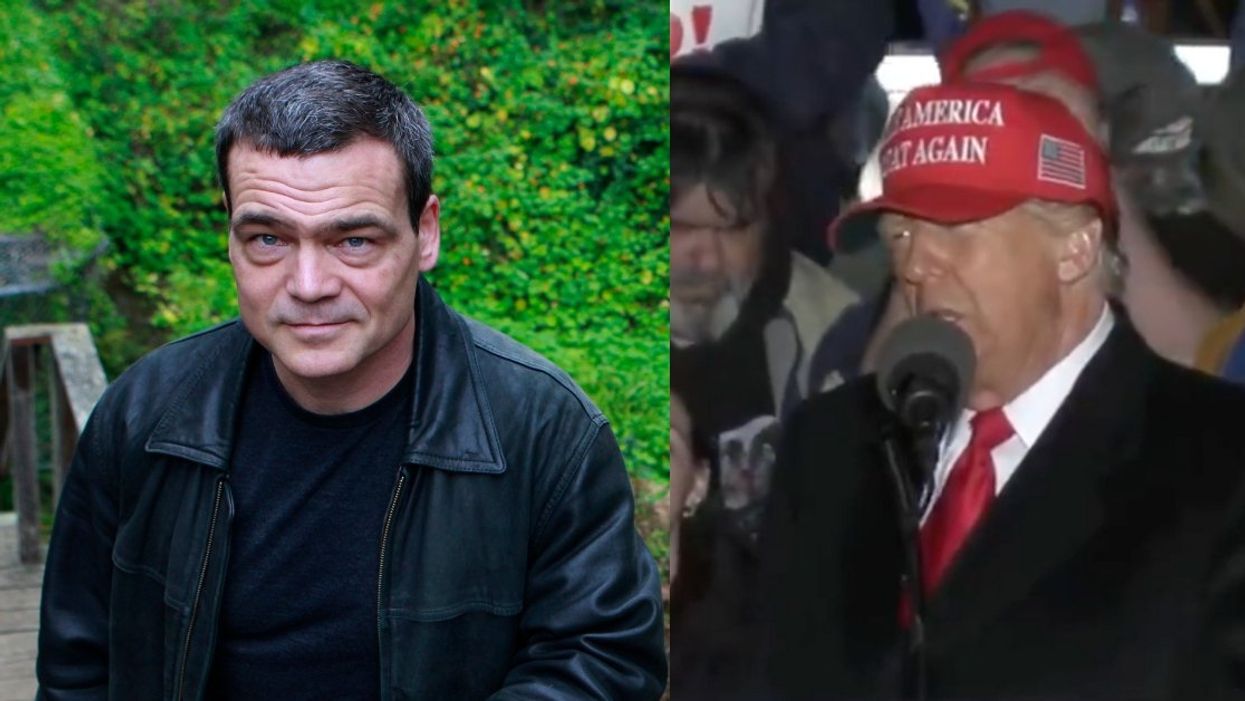Biographer and historian T.J. Stiles—a two-time Pulitzer Prize winner and recipient of a National Book Award—took former President Donald Trump to task for his "unhinged" rant about the Battle of Gettsysburg during a MAGA rally in Schnecksville, Pennsylvania.
Trump called the historical battle "unbelievable" during his first campaign rally in the battleground state, adding that it had a profound effect on the country's future success:
"It was so much, and so interesting, and so vicious and horrible, and so beautiful in so many different ways—it represented such a big portion of the success of this country."
He also made fawning remarks about Confederate General Robert E. Lee, whose plans resulted in high casualties at a time when the Confederacy had a shortage of manpower:
"Gettysburg, wow—I go to Gettysburg, Pennsylvania, to look and to watch. And the statement of Robert E. Lee, who's no longer in favor—did you ever notice it?"
"He's no longer in favor. 'Never fight uphill, me boys, never fight uphill.' They were fighting uphill, he said, 'Wow, that was a big mistake,' he lost his great general. 'Never fight uphill, me boys,' but it was too late."
You can hear what Trump said in the video below.
Shortly afterward, Stiles opined that Trump's narrative about Gettysburg was an "inarticulate" and "reductive" exercise in flattery, and went on to expertly deconstruct it in a series of posts on X, formerly Twitter.
He further noted that Trump's assessment of Lee was inaccurate, as Lee was not documented to have issued downslope-only orders and was not a mere "passive observer." He described Trump's portrayal of the events as "rambling" and "unhinged."
Stiles pointed out that Lee directed his troops "to enslave all the Black people they could find," confirming that the heroic image of the battle Trump relayed was false because it was in fact "a big slave raid."
He added the following criticisms of Trump's proposed narrative:
"A lot has been said about politicized "revisionist" history. But history *without* revision is political as well. Many still have a vague notion in their heads of Civil War history written by segregationists a century ago to serve an agenda. It serves Trump's agenda too."
Many joined him in calling Trump out.
Trump has previously made inaccurate claims about the Civil War.
During a rally in Iowa in January, the former president remarked that the war "could have been negotiated," suggesting it could have been avoided altogether. However, Trump did not elaborate on how such negotiation might have been achieved. He expressed a mix of feelings about the war, finding it both "horrible" and "fascinating."
Trump, who suggested that Civil War-era President Abraham Lincoln would not have the same historical significance “if he negotiated [the war]," was criticized by former Wyoming Representative Liz Cheney, who said that neither slavery, secession, nor Lincoln's ability to preserve the Union could have ever been negotiated given the circumstances of the time.
In fact, prior to the onset of the Civil War, there were numerous attempts to broker agreements aimed at preserving the Union. However, the contentious issue of slavery in the South proved insurmountable through compromise, ultimately leading to the conflict.














 @DuncanCecil/X
@DuncanCecil/X @@realDonaldTrump/Truth Social
@@realDonaldTrump/Truth Social @89toothdoc/X
@89toothdoc/X @xray_media/X
@xray_media/X @CHRISTI12512382/X
@CHRISTI12512382/X
 @sza/Instagram
@sza/Instagram @laylanelli/Instagram
@laylanelli/Instagram @itssharisma/Instagram
@itssharisma/Instagram @k8ydid99/Instagram
@k8ydid99/Instagram @8thhousepath/Instagram
@8thhousepath/Instagram @solflwers/Instagram
@solflwers/Instagram @msrosemarienyc/Instagram
@msrosemarienyc/Instagram @afropuff1/Instagram
@afropuff1/Instagram @jamelahjaye/Instagram
@jamelahjaye/Instagram @razmatazmazzz/Instagram
@razmatazmazzz/Instagram @sinead_catherine_/Instagram
@sinead_catherine_/Instagram @popscxii/Instagram
@popscxii/Instagram
